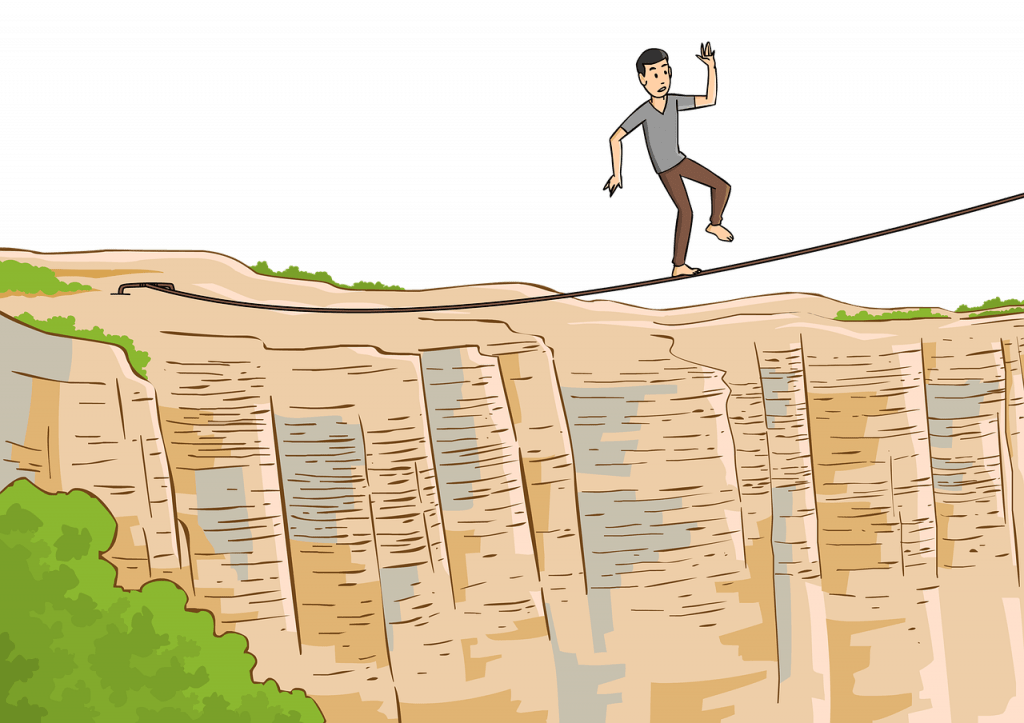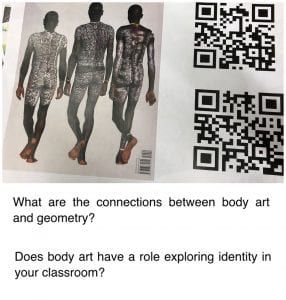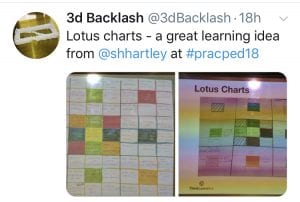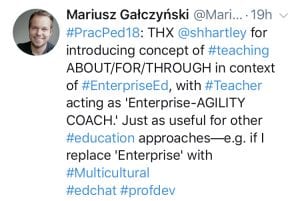
MoteOo / Pixabay
I have been regularly passing under a huge electronic billboard advertising a private school with the words, “Well taught”. I wonder what they are trying to convey with those two words and with the italics emphasising the ‘taught’. Are they saying their classes are teacher centric? To me it certainly conveys an image of delivering content. Supporting this picture, Dictionary.com says taught is the past tense of teach:
If marketing is supposed to be about conveying a point of difference, the unique selling point, is this to differentiate the school from the progressive trends in education promoting student-centred learning, project based learning, experiential learning and the like? I know the school by reputation and understand they are not completely at the progressive end but I didn’t think they were a traditional desks in row, teacher up-front, students learning in silence type of school either.
But here I am, thinking in dichotomy terms when I fight so much against false dichotomies. In my own educational philosophy and practice I see a role for both traditional and progressive styles of teaching and learning and constantly promote balance in all aspects of learning. I believe schools should be “saturated in pedagogies” (Thomson, 2001, p.19).
This week my readings about the Australian Curriculum, what it is and what it could and should be, also falls into two similar camps. On one side is the discipline, subject based education perceived as being about the delivery of content for knowledge and understanding, truly in line with the dictionary.com definition of teach. On the other side, is the capabilities approach or social justice view of education. Lingard and McGregor (2014) word it as being about “what students should learn or become”.
The Australian Curriculum at one stage was seen as an exciting opportunity to shift to a capabilities approach to education and I enjoyed reading what Alan Reid (2005, 2013) had to say on the matter when I was completing my M.Ed. In the end the Australian Curriculum stuck to the discipline/subject based approach (learning areas) with a sprinkling of general capabilities and cross-curriculum priorities for good measure. What I’ve seen in practice is that since the curriculum is so content heavy, school curriculum starts at that point. The content is spread over the available time period and it is usually a tight squeeze. The extra school activities are factored in, like swimming carnivals, camps and excursions. Assessment dates are planned and up the line someone with oversight checks that assessments across subjects aren’t too clumped together, unless they are part of a planned assessment/exam week. A program with lessons is put together by one or more of the teachers on the subject. When I first started teaching these were mainly textbook driven and indeed some textbook publishers produce their own. At the end of the unit, or more often at the end of the year when the Head of Department requested them, teachers submit annotated programs signing off how much of the planned curriculum was implemented and what substituted for what wasn’t. Due to how much the teaching year is rushed these were rather perfunctory exercises most of the time. Accompanying the annotated programs would be examples of students’ work, assessment tasks and other fiddly requirements. When a new syllabus came in, the old programs were transferred across as much as possible to form the foundation of the new curriculum. Programs were examined to see where there were any existing plans that could be deemed as meeting General Capabilities and Cross Curricular Priorities and marked as such. Any not covered, were jammed into the program in some way, so they could be ticked off the compliance list of things to do. Any real thought or consideration as to actually making it about students’ learning instead of merely meeting compliance measures were usually cast aside because there simply wasn’t time. In the main, NSW curriculum is so content heavy the learning needs to be rather superficial to cover it all and the deep thinking and problem solving I’d like to see is sacrificed in this endeavour to cover everything in time for the exams.
So, in practice a serious and laudable attempt to refine what schools should be teaching about today in the compulsory years has become heavily complicated and bureaucratic––overloading what teachers and students are ostensibly required to achieve in a way that can only be met by not taking seriously all of the requirements or else seriously making this activity too a form-fulfilling accountability of teaching to the test. (Yates, 2013, pp.47-48)
The more I changed schools, the more exam focused the schools were at the senior end of high school, where I taught the most. Many of the teachers taught how to achieve the best possible mark in the HSC, to maximise ATAR, rather than teaching the subject for its own sake. This had a lot to do with me leaving full-time teaching. These external, high-stakes tests have lost the purpose of education all together and made it all about the gateway to the REST OF YOUR LIFE. A paper written to propose a change to the ATAR system, outlines my issues with the ATAR more eloquently than I:
A single number is a thin representation of the outcome of 13 years of schooling. A single number does not capture the attainments and qualities of any student, and is not a reliable predictor of future academic success for students with scores below 70, or success in life. (O’Connell, Milligan & Bentley, 2019, p.8)
According to O’Connell, Milligan & Bentley (2019), ATAR was established for consistency in distinguishing the academically capable students. It is also a low cost method for universities to select students, but now it has become THE goal for senior students, often resulting in abandoning other worthwhile goals, such as the pursuit of other real interests, extra-curricular activities, casual jobs. There is also a rise in associated mental health issues. 30% rely on ATAR for entry to university, the other 70% suffer from a focus on this. Due to assessment tasks being exam focused, pedagogy is about developing memory and recall with broader aspects of learning overlooked. (Entire paragraph paraphrased from p.7).
So if not exam-driven regurgitation demonstrating narrow knowledge and understanding, then what? I have started summarising what I want from our schooling system in one word, agency. The OECD (2019) describes agency as being “about acting rather than being acted upon; shaping rather than being shaped; and making responsible decisions and choices rather than accepting those determined by others” (p.34). I see agency as being about empowering students so they feel they have some control and direction in their lives; that they can make informed decisions about what they do in life, whether they work for an employer or be self-employed; that they have something worthwhile to contribute to community and can choose how they want to contribute (or not); that they can try to change the world, adapting and adopting behaviours and actions to contribute to social change in some way; that they feel brave enough to take opportunities as they arise or even create their own opportunities through guts and determination, not being scared to fail every now and again. Knowledge and understanding gives people a certain amount of confidence but it’s feeling capable that is important for agency. This is where what one does with knowledge and understanding that’s important.
Student agency relates to the development of an identity and a sense of belonging. When students develop agency they rely on motivation, hope, self-efficacy and a growth mindset (the understanding that abilities and intelligence can be developed) to navigate towards well-being. This enables them to act with a sense of purpose, which guides them to flourish and thrive in society. (OECD, 2019, p.35)
The General Capabilities are very important but as Skourdoumbis (2015) pointed out, they are quite generic and as I’ve said above, in practice they are hardly given real thought by many teachers and schools. I believe there needs to be less teaching to the test, in fact very little importance given to tests at all, and make education truly about knowledge, understanding, skills, values and attitudes. These are the words used by NESA in NSW syllabuses but the importance of each diminishes rapidly as you read them left to right. The skewed emphasis can’t wholly be blamed on the school level, it’s also the rhetoric in the educational and government bodies, as well as in the media. The importance given to knowledge is most evident in all these institutions’ attitudes towards NAPLAN, ATAR and in NSW, the HSC.
Instead, as Skourdoumbis (2015) argues, there should be a capability approach to education that provides “rounded attention” (p.35) to students, thereby developing agency. In quick summary Skourdoumbis (2015) states:
- We need to educate for development of reason and thereby provide students with more freedom in their personal decision-making
- We need to educate for critical reflection of the world so that students can see how they may contribute to change
- We need to educate more broadly for empowerment.
Some schools are pushing back against the “testing-led curriculum” (Yates, 2013, p.43) and instead providing education that “serves multiple, life-enhancing purposes through a rich array of pedagogic practices” (Thomson, Lingard & Wrigley, 2012, p.2). This is why I am researching enterprise education. Enterprise education gives a focus for the general capabilities, and as much as I question the neoliberal underpinnings of enterprise education, I have the utmost respect for the way it aims to build agency in students, equipping them to go out into the world and conquer it; confident in their standing as an individual, friend and family member; willing and able to be a contributor to community; and knowing they are someone with value to contribute to a workplace or as an entrepreneur.
References
Lingard, B., & McGregor, G. (2014). Two contrasting Australian curriculum responses to globalisation: What students should learn or become. Curriculum Journal, 25(1), 90-110. DOI:10.1080/09585176.2013.872048
O’Connell, M., Milligan, S.K., &Bentley, T. (2019). Beyond ATAR: a proposal for change. Koshland Innovation Fund, Melbourne, Victoria. https://apo.org.au/node/261456
OECD. (2019). OECD Future of Education and Skills 2030: OECD Learning Compass 2030 A Series of Concept Notes, OECD Publishing. http://www.oecd.org/education/2030-project/teaching-and-learning/learning/learning-compass-2030/OECD_Learning_Compass_2030_Concept_Note_Series.pdf
Reid, A. (2005). Rethinking national curriculum collaboration: Towards an Australian curriculum. https://digitised-collections.unimelb.edu.au/handle/11343/115751
Reid, A. (2013). Renewing the public and the role of research in education. The Australian Educational Researcher, 40(3), 281-297. https://link.springer.com/article/10.1007/s13384-013-0116-x
Skourdoumbis, A. (2015). Distorted representations of the ‘capability approach’ in Australian school education. Curriculum Journal, 26(1), 24-38. DOI:10.1080/09585176.2014.955512
Thomson, P. (2001). How Principals Lose ‘Face’: A disciplinary tale of educational administration and modern managerialism. Discourse: Studies in the Cultural Politics of Education, 22(1), 5-22. DOI:10.1080/01596300120039722
Thomson, P., Lingard, B., & Wrigley, T. (2012). Ideas for changing educational systems, educational policy and schools. Critical Studies in Education, 53(1), 1-7. DOI:10.1080/17508487.2011.636451
Wrigley, T., Lingard, B., & Thomson, P. (2012). Pedagogies of transformation: Keeping hope alive in troubled times. Critical Studies in Education, 53(1), 95-108. DOI:10.1080/17508487.2011.637570
Yates, L. (2013). Revisiting curriculum, the numbers game and the inequality problem. Journal of Curriculum Studies, 45(1), 39-51. DOI:10.1080/00220272.2012.754949










